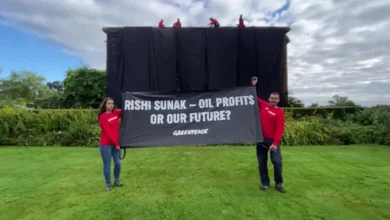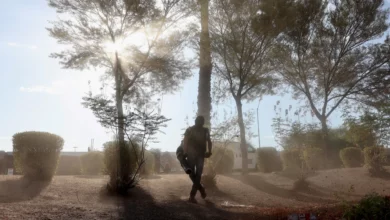Copenhagen–Egypt is participating in the United Nations Framework Convention on Climate Change’s 15th Conference of the Parties (COP15) with an official delegation from various ministries and state agencies. One of the key negotiators in the Egyptian delegation is Helmy Abouleish, who founded the Egyptian National Competitiveness Council and is now the managing director of the Sekem Group, an enterprise that, among other projects, focuses on developing sustainable agriculture. As the COP15 talks heat up, Abouleish spoke to Al-Masry Al-Youm about the potentials for striking a binding deal in Copenhagen, Egypt’s aspirations from this deal, and the dynamic between developed and developing countries in the negotiations.
Al-Masry Al-Youm: What is your impression of the status of the negotiations here so far?
Helmy Abouleish: Generally speaking I have a very good impression of the negotiations. The international public pressure is so great that no politician can afford a failure. Nevertheless, the discussions are very harsh. The ANNEX 1 countries (industrialized countries) still do not make substantial commitments with respect to their own reductions and financing for developing countries. I am convinced that an agreement will be reached. However, this will only give a direction. A substantial number of questions have to be answered afterwards on how the results can be put into action. The real work only starts then. In the end, it is about the consumers and the private sector, which only will be touched by the results after 2012 [when the first commitment period of the Kyoto Protocol ends].
Al-Masry: What’s your expectation for the deal? Will it succeed, collapse, be a political agreement, a legal one? Will it build on Kyoto or be a brand new agreement?
Abouleish: I am convinced that a deal will be reached. I suppose that it will build on the Kyoto Protocol, despite the efforts of some ANNEX1 countries to drop it. I am also optimistic that the public pressure in the industrialized countries is large enough to ensure substantial commitments in terms of emission reductions and financing. However, again, the real work is still yet to come. Finally, any agreement has to be supported by the people. Everyone needs to, starting today, consider and reduce his impact on the climate.
Al-Masry: Sustainable agriculture is an important issue on the Egyptian agenda. Where is it in the context of the COP15 negotiations that you took part in?
Abouleish: The crucial importance of agriculture, and especially forestry, is undisputed in Copenhagen. There are basically two takes on how it can be included: First, in the context of amendments to the existing Kyoto Protocol, where it is limited by the current restrictions in scope. Furthermore, the Conference of Parties, where the countries that did not sign the Kyoto Protocol are also represented, will discuss this issue as well. Here, agriculture can either be included via a sectorial approach or via expanding the scope of the Reduced Emissions from Deforestation and Forest Degradation (REDD). However, all the non-Kyoto Protocol options still need a lot of research to form a sound scientific basis. Finally, the issue of sustainability has to be considered separately. There is a threat that the proposals create perverse incentives that undermine sustainability. In order to avoid this threat, specific requirements must be carefully developed. This has to be done in the next couple of years.
Al-Masry: How do you see the Egyptian business, industrial and social attitudes toward climate change commitments like carbon emission reductions?
Abouleish: First, due to its high vulnerability to drought and sea level rise, Egypt is one of the nations most affected by climate change. In the current situation, Egypt as a whole cannot make commitments for emissions’ reduction. Nevertheless, the public and private sector, as well as the consumer, should have in mind the importance of reducing emissions. There is a vast potential for reducing emissions, which goes hand in hand with reducing costs. Thus, we still have to do a lot in terms of awareness creation. Furthermore, there are huge funds available for supporting “green development,” mostly, but not exclusively, from the Clean Development Mechanism. At the moment Egypt still lacks the full capacity to make use of them. We urgently have to improve this, since it is how we can address climate change, social, and economic development simultaneously. The big success of the Egyptian Junior Business (EJB) event in December showed that climate change is a concern for the private sector. These efforts have to be continued and expanded.
Al-Masry: What’s your vision as an Egyptian businessman of the possible cooperation between less developed countries and developed countries on climate change issues, especially with regards to financial mechanisms, as well as mitigation?
Abouleish: Basically the Clean Development Mechanism is a great instrument to foster the cooperation between developed and less developed countries. However, it has to be improved. Right now, the procedures are still too complicated and too expensive. Thus, the crucial issue is how can we link international finance with small scale partners in less developed countries. An example is Egyptian farmers. These small scale problems have the highest potential for reduction and development per invested capital. As a businessman, I also want to increase the use of these instruments if possible.




